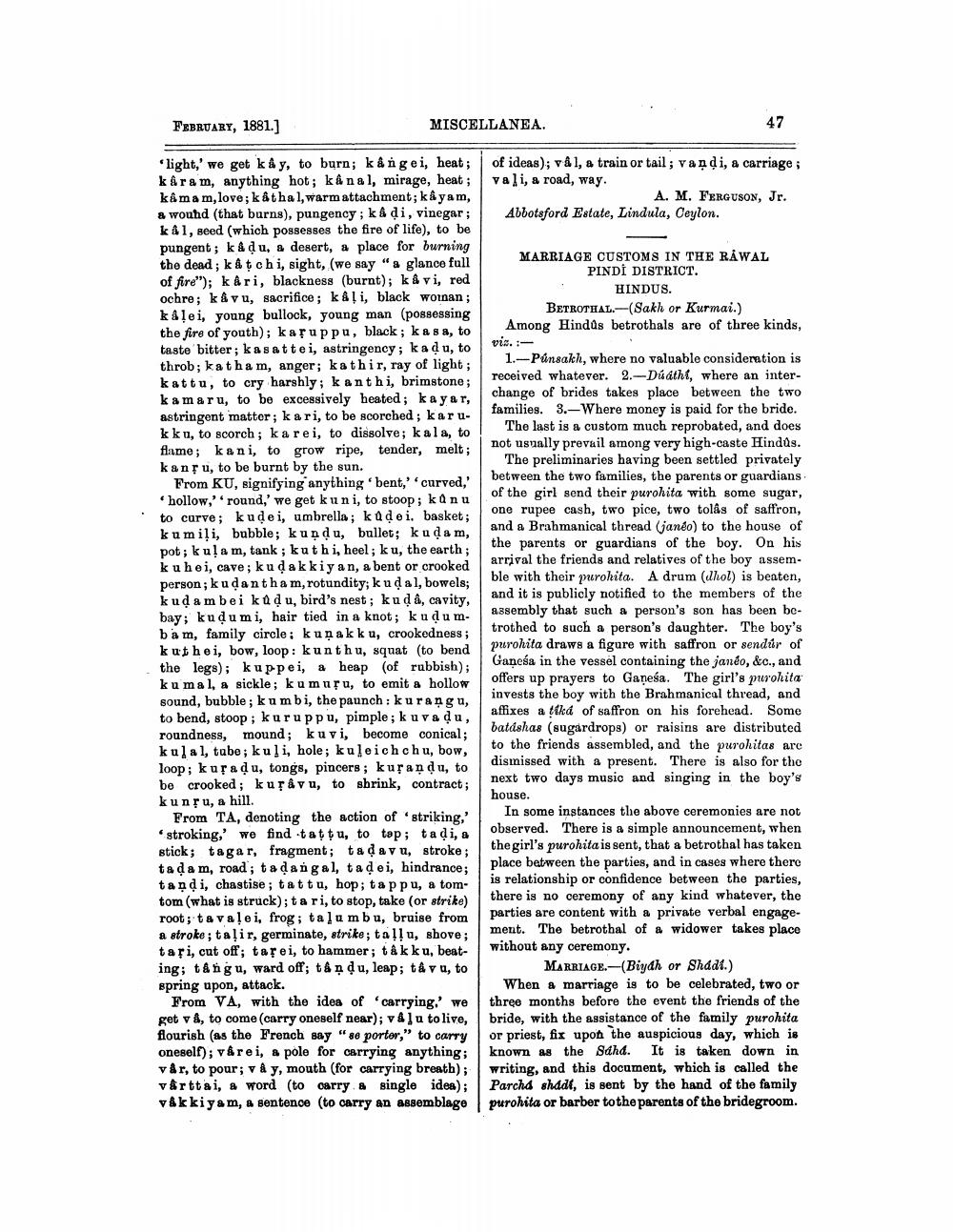________________
FEBRUARY, 1881.]
'light,' we get kây, to burn; kângei, heat; karam, anything hot; kanal, mirage, heat; kama m, love; k&thal, warm attachment; k & yam, a wound (that burns), pungency; k & ḍi, vinegar; kal, seed (which possesses the fire of life), to be pungent; k & ḍu, a desert, a place for burning the dead; kåt chi, sight, (we say "a glance full of fire"); kâri, blackness (burnt); k & vi, red ochre; kavu, sacrifice; kâļi, black woman; kalei, young bullock, young man (possessing the fire of youth); karuppu, black; ka sa, to taste bitter; kasattei, astringency; kadu, to throb; katham, anger; kathir, ray of light; kattu, to cry harshly; kanthi, brimstone; kamaru, to be excessively heated; kayar, astringent matter; kari, to be scorched; karukku, to scorch; ka rei, to dissolve; kala, to flame; kani, to grow ripe, tender, melt; kanru, to be burnt by the sun.
From KU, signifying anything 'bent,' 'curved,' 'hollow,' 'round,' we get kun i, to stoop; kanu to curve; kudei, umbrella; kudei. basket; kumili, bubble; kundu, bullet; kudam, pot; kula m, tank; kuthi, heel; ku, the earth; kuhei, cave; kudakkiyan, a bent or crooked person; kuḍantham, rotundity; k udal, bowels; kuḍambei kudu, bird's nest; kuḍâ, cavity, bay; kudumi, hair tied in a knot; kudum bam, family circle: kunak k u, crookedness; kut hei, bow, loop: kunthu, squat (to bend the legs); kuppei, a heap (of rubbish); kumal, a sickle; kumuru, to emit a hollow sound, bubble; kumbi, the paunch: kurangu, to bend, stoop; kuruppu, pimple; kuva du, roundness, mound; kuvi, become conical; kulal, tube; kuli, hole; kuleichchu, bow, loop; kura du, tongs, pincers; kurandu, to be crooked; kuravu, to shrink, contract; kunṛu, a hill.
MISCELLANEA.
From TA, denoting the action of 'striking,' stroking, we find tattu, to top; tadi, a stick; tagar, fragment; tadavu, stroke; tadam, road; taḍangal, tadei, hindrance; tandi, chastise; tattu, hop; tappu, a tomtom (what is struck); ta ri, to stop, take (or strike) root; tava lei, frog; talum bu, bruise from a stroke; talir, germinate, strike; taļļu, shove; tari, cut off; tarei, to hammer; tak ku, beating; tângu, ward off; tân du, leap; tâ vu, to spring upon, attack.
From VA, with the idea of carrying,' we get vå, to come (carry oneself near); valu to live, flourish (as the French say "se porter," to carry oneself); våre i, a pole for carrying anything; vår, to pour; v å y, mouth (for carrying breath); varttai, a word (to carry a single idea); vakkiyam, a sentence (to carry an assemblage
47
of ideas); vål, a train or tail; vandi, a carriage; vali, a road, way.
A. M. FERGUSON, Jr. Abbotsford Estate, Lindula, Ceylon.
MARRIAGE CUSTOMS IN THE RAWAL PINDI DISTRICT.
HINDUS.
BETROTHAL. (Sakh or Kurmai.)
Among Hindûs betrothals are of three kinds, viz.:
1.-Púnsakh, where no valuable consideration is received whatever. 2.-Dúathi, where an inter
change of brides takes place between the two families. 3.-Where money is paid for the bride.
The last is a custom much reprobated, and does not usually prevail among very high-caste Hindus.
The preliminaries having been settled privately between the two families, the parents or guardians of the girl send their purohita with some sugar, one rupee cash, two pice, two tolâs of saffron, and a Brahmanical thread (janéo) to the house of the parents or guardians of the boy. On his arrival the friends and relatives of the boy assemble with their purohita. A drum (dhol) is beaten, and it is publicly notified to the members of the assembly that such a person's son has been bctrothed to such a person's daughter. The boy's purohita draws a figure with saffron or sendur of Ganesa in the vessel containing the janéo, &c., and offers up prayers to Gaṇeśa. The girl's purohita invests the boy with the Brahmanical thread, and affixes a tkd of saffron on his forehead. Some batáshas (sugardrops) or raisins are distributed to the friends assembled, and the purohitas are dismissed with a present. There is also for the next two days music and singing in the boy's house.
In some instances the above ceremonies are not observed. There is a simple announcement, when the girl's purohita is sent, that a betrothal has taken place between the parties, and in cases where there is relationship or confidence between the parties, there is no ceremony of any kind whatever, the parties are content with a private verbal engagement. The betrothal of a widower takes place without any ceremony.
MARRIAGE. (Biyah or Shadi.)
When a marriage is to be celebrated, two or three months before the event the friends of the bride, with the assistance of the family purohita or priest, fix upon the auspicious day, which is known as the Sahd. It is taken down in writing, and this document, which is called the Parcha shádí, is sent by the hand of the family purohita or barber to the parents of the bridegroom.




